On December 10th, 2009 JusticeMaker Buhle Dube in Swaziland organized an event to honor the 61st anniversary of the Universal Declaration of Human Rights (UDHR). The event was held at the FanCourt Guest House in Coates Valley Manzini in conjunction with The Centre for Human Rights and Development (The Centre), One Circle – a NGO that focuses on young women’s’ rights, as well as the University of Swaziland’s Students Law Society. The goal of the event was to raise awareness on the importance of protecting human rights and to commemorate the significance of the UDHR. The event also sought to encourage dialogue within the local community on human rights issues and to facilitate improved working relationships amongst members of the criminal justice system and legal profession.
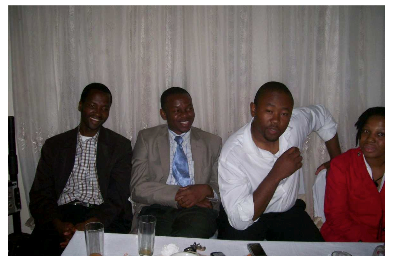
Attorneys Goodnews Dlamini, Knosinathi Manzini, Knowledge Manana, and law student Nomfanelo Kunene.
Despite the difficult weather conditions, 45 individuals attended the event. There was a variety of participants from the community, including privately-practicing attorneys, public prosecutors, magistrates, police officers, law students, university students, NGO personnel, and other members of the general public. This diverse group engaged in an open and honest dialogue on the issues of safeguarding human rights, as well as possible solutions that can be pursued to alleviate abuses. The event commenced with an opening prayer conducted by Magistrate Joe Gumede, after which JusticeMaker Buhle Dube gave an in-depth presentation on the history of the UDHR and the achievements of his JusticeMakers project in Swaziland over the past year. Dube’s presentation summarized the research, forums, and training sessions he had carried out on the problems community police in Swaziland are confronted with. Presentations were also given regarding the Customary Court System and the efforts to monitor these courts to ensure that increased procedural protections are in place for the accused. In Swaziland there is a dual criminal justice system that has both Customary Courts and Magistrates Courts. Presided over by a court president, the Customary Courts rely on orally transmitted Swazi customs and the Swazi Courts Act of 1950 when producing their decisions. A parallel magistrate court system employing legal representation and western-style law codes also exists. The Customary Court System has corporal punishment such as caning, although no longer used in practice, remains on the books as a constitutionally viable sentence.
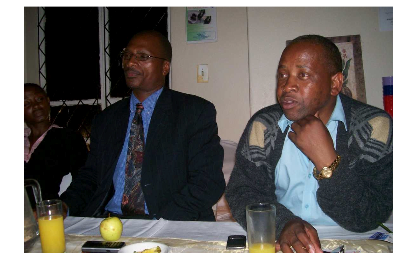
Magistrates Mdluli (left) and Gumede listening attentively during the event.
Following Dube’s presentation Khabo Dlamini from One Circle gave a presentation on the organization’s mission to empower women, to raise awareness on gender issues within Swaziland, and to disseminate accurate information on women’s rights and the plight of young women in society. Dlamini spoke with concern for women who have been abused, and the need to create a facility to provide assistance to abused women who are fleeing their aggressors. Such facilities would be helpful to ensure these women are able to gain the skills needed for generating an income. There were also discussions regarding the abuse of same-sex partners and the cultural concerns surrounding homosexuality which are present within Swaziland. The discussion of homosexuality and gender issues sparked debates regarding Swaziland’s constitution, which prohibits discrimination on the basis of gender. Finally, Mr. Gcina Mhlanga, the President of the University of Swaziland Students Law Society talked about the role of students in human rights advocacy and the importance of encouraging student interns to volunteer with human rights organizations.
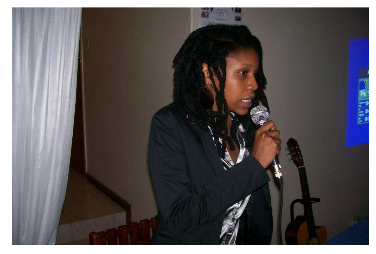
One Circle’s Khabo Dlamini presenting during the event.
Funding for the event was received through fundraising efforts conducted at the local level and suggested donations of R50 – the equivalent of $7 per participant – were made. Many individuals felt compelled to give even more money than the suggested amount, while others donated their skills, cars, time, energy and resources in an effort to ensure that the event was a success. The law firms of CZ Dlamini Attorney of Matsapha, MH Mdluli Attorneys of Manzini, and Mkhwanazi Attorney of Mbabane pledged their commitment to assist in furthering The Centre’s goals and initiatives, and were then presented with certificates of appreciation for their support.
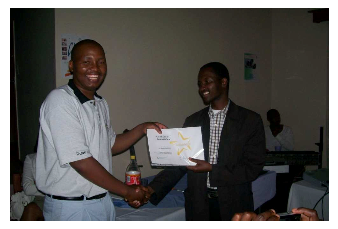
JusticeMakers Angelo Dube presenting a certificate of appreciation to Attorney Goodnews Dlamini of CZ Dlamini Attorneys.
Future plans were also made to host a ‘Summer School for Human Rights’ spanning three to five days, which would involve trainers throughout the Southern Africa region, as well as participants from Europe, Asia and the Americas, to train members of the legal community within Swaziland. There would be a focus in the trainings on the protection of human rights and techniques for public defense.
As a symbolic measure each attendee was given a pink rose, tied by a red ribbon to a “thank you” card – thanking each individual for their attendance and commitment to human rights. The rose symbolized the fragility of humankind, and the need to nourish this fragility with human dignity. 61 pink roses were prepared and given, in honor of the 61st year of the UDHR, which will now be a standing tradition at The Centre. Next year 62 roses will be given to commemorate the 62nd year in 2010. The pink roses were a touching and unique way to honor the rich significance of the UDHR, and to encourage people to renew that commitment each year by celebrating International Human Rights Day on December 10th. Musical entertainment for the event was provided by Buddy Masango and guests dined to a dinner of abundant cuisines prepared for the special day. Press coverage for the event was provided by The Times of Swaziland.
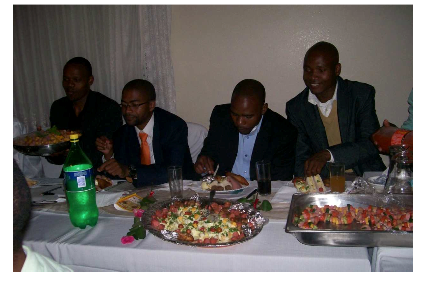
Law students Mpilo, Gcina Mhlanga (President of the University of Swaziland Student Law Society), Mzandile and Nathi.